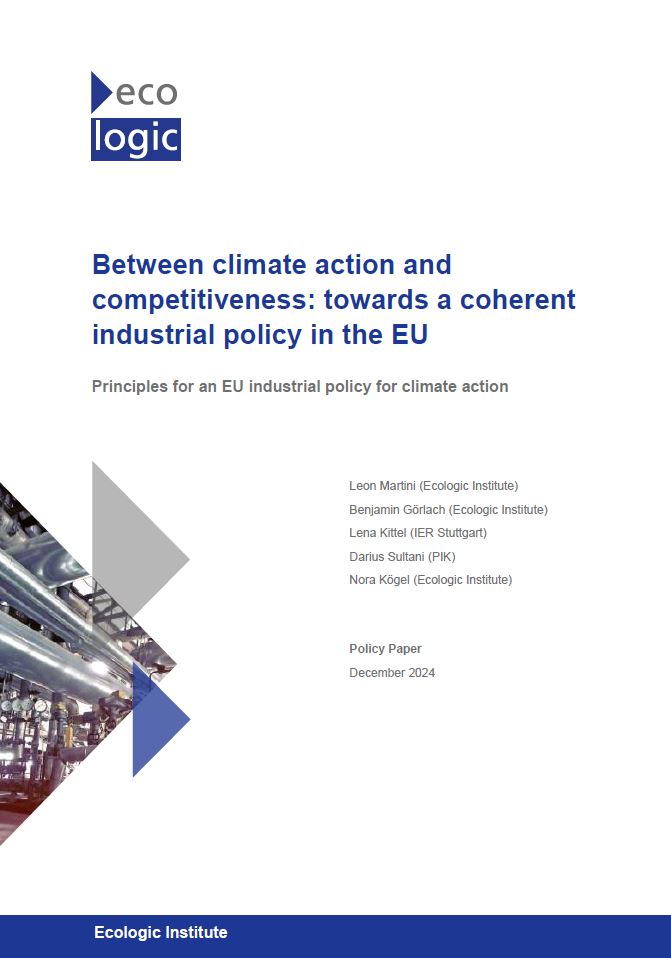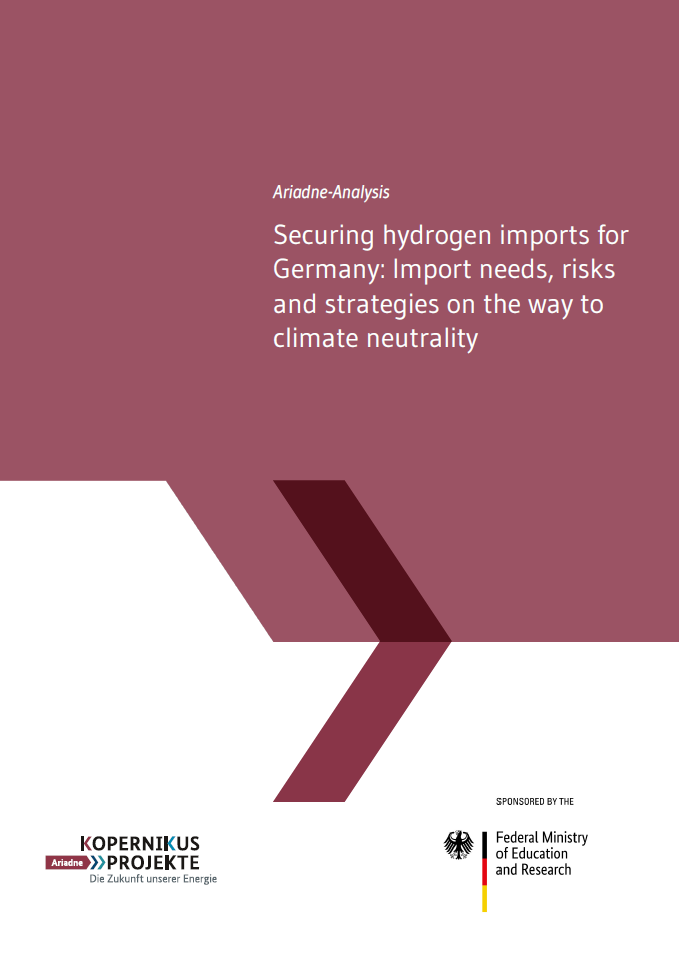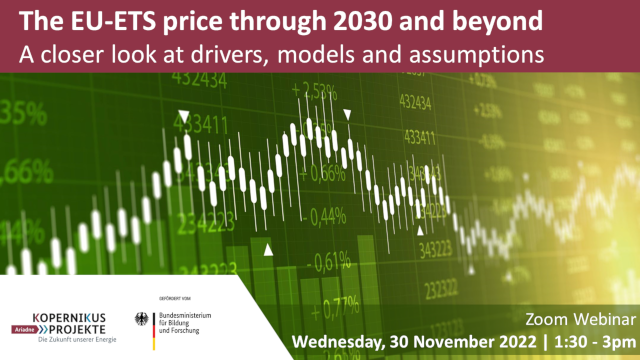Discussion on Modelling EU ETS Prices to 2030 and beyond
|© Benjamin Görlach
Shaping EU Climate and Energy Policy: Insights from and for the Ariadne Project
- Event
- Date
-
-
- Location
- Brussels, Belgium
- Speaker
-
Benjamin Görlach
With the Fit-for-55 package about to be put into law, and the RePowerEU plan adopted in response to the energy crisis, EU climate and energy is undergoing the most profound change in years, getting the EU on track to a post-fossil energy system. In a three-day series of events, partners from the Ariadne research project presented key insights from their work that is relevant for the further development of EU climate and energy policy, and discussed these with representatives from political institutions, academia, civil society and business. The events served to share research insights, to discuss and validate findings and their relevance for EU policy process, and to gather inputs for further research. The Ariadne project is a collaborative effort by more than 25 German research institutions that investigates strategies and instruments to advance the energy transition and to achieve climate goals in an efficient and socially balanced way. Ecologic Institute supports the linkage of research with the EU climate and energy discussion.
-
30 Nov 22: The EU-ETS price through 2030 and beyond: A closer look at drivers, models and assumptions
In this three-session workshop, participants discussed the types of models, implementation details as well as core assumptions employed in the analysis of ETS prices targeted to inform the policy debate. More specifically, the workshop demonstrated the diversity of approaches, discussed their pros and cons, and identified major sensitivities and arising developments affecting the price of carbon through the end of this decade and beyond. While the first two sessions of the workshop took place as a closed-door discussion between academic modellers, carbon market analysts and invited guests, the third session had the form of a public webinar. The recording of the webinar can be found below.
Organisers: Michael Pahle (PIK), Benjamin Görlach (Ecologic Institute)
Documentation – Input Material and Takeaways from the Workshop
Introductory presentation by Michael Pahle: A closer look at Drivers, Models and Assumptions
Overview of the different models, their approaches and their results
Webinar presentation by Dr. Ottmar Edenhofer: Why should we care about the ETS price in 2030 and beyond?
-
30 Nov 22: Climate Recon 2050 Webinar "Charting a path towards climate neutrality in turbulent times – Tools and institutions that can support stable long-term climate policy"
This public event discussed how stable long-term policy direction towards climate neutrality can be maintained during times of crisis. To explore this question, it dived into the role of two instruments that can provide stability in this context: long-term climate strategies and scientific climate advisory councils. To exchange views on these topics, the event featured experienced practitioners from the European Commission and national institutions. This event was organized by Climate Recon 2050 and the Ariadne project and was accessible both in person and electronically.
Organisers: Matthias Duwe (Ecologic Institute), Ewa Iwaszuk (Ecologic Institute)
- 1 Dec 22: The (in)coherence between European hydrogen and energy policies
The use of renewable and low carbon hydrogen is seen as a promising solution to decarbonize sectors that are difficult to electrify. To support the market ramp-up of the new technology, a comprehensive and coherent European legislative framework covering the complete hydrogen value chain is necessary. In this panel, workshop participants discussed developments, potentials and dangers of regulatory incoherencies to form an effective European hydrogen governance.
Organisers: Prof. Dr. Michèle Knodt (Technical University Darmstadt), Nils Bruch (Technical University Darmstadt)
Presentation by Nils Bruch and Michèle Knodt: (In)Coherence in Regulating Hydrogen in the European Union
Response by Esther Bollendorff, CAN Europe
- 1 Dec 22: Strengthening the Governance Mechanism: Achieving 2030 Climate Targets and Closing the EU Green Deal Gap
In response to the Russian war of aggression against Ukraine, the European Commission has presented an update of the Fit for 55 package and the REPowerEU plan. However, this set of measures has a vast blind spot: the Governance Regulation is not on the reform agenda. Why this situation is a large-scaled grievance that should be resolved as soon as possible, and what options for action are available in respect thereof was the subject of this panel. Particularly, the question of why it is not sufficient to adapt to only sectoral measures and a revision of the governance framework is urgently needed were discussed.
Organisers: Eva-Maria Thierjung (Universität Greifswald), Fabian Pause (Stiftung Umweltenergierecht), Prof. Dr. Michèle Knodt (Technical University Darmstadt)
Presentation by Eva-Maria Thierjung, Fabian Pause and Sabine Schlacke: Strengthening the Governance Mechanism
Workshop summary compiled by the Organisers
- 1 Dec 22: The REPowerEU plan: Go-to areas for renewable energies
As part of their RePowerEU plan, the EU Commission called on Member States to swiftly map, assess and secure land available for new renewable energy projects. They followed up on this call by proposing the identification of so-called "go to areas" in the Renewable Energy Directive. These shall be areas particularly suitable for renewables projects, i.e. areas where no significant impact on the environment is to be expected and where planning and permitting processes can proceed in a quicker pace. This session discussed whether and how those proposals may help to speed up the deployment of renewables in line with the EU’s (more ambitious) goals.
Organisers: Fabian Pause (Stiftung Umweltenergierecht – Foundation for Environmental Energy Law), Prof. Dr. Sabine Schlacke (Universität Greifswald)
Presentation by Fabian Pause: REPowerEU – Go-to-areas for Renewables and Emergency Measures to Accelerate Deployment
Presentation by Sabine Schlacke: Emergency Measures to Accelerate the Energy Transition – Overriding Public Interest of Renewable Energies
- 1 Dec 22: Concepts, Crises & Compromises: Reforming the EU ETS in turbulent times
This workshop focused on key design aspects of the EU ETS such as the MSR and Article 29a (and 30h) and particularly addressed people working on these mechanisms. How do assessments of the current state of the EU ETS differ, and what are the key challenges that need to be addressed by the ongoing reform? What are the expectations behind named design proposals? How does the political process constrain compromises on the design of the EU ETS? Moreover, the session informed the research agenda for the next phase of the Ariadne project.
Organisers: Prof. Dr. Grischa Perino (Universität Hamburg), Dr. Maximilian Willner (Universität Hamburg)
Presentation by Maximilian Willner and Grischa Perino: Concepts, Crises, Compromises – Reforming the EU ETS in turbulent times
- 2 Dec 22: Interactive Workshop: Scanning threats to the EU internal energy market
Since the Russian attack on Ukraine, energy policy in Europe has been in uncharted territory – in terms of fossil fuel price developments, but also in terms of policy interventions in energy markets. This three-hour workshop assembled selected experts (policy practitioners, other stakeholders and academics) to take stock of some of the main threats that the EU internal energy market currently faces, and – in an interactive way – to explore their likelihood, their potential significance, and their possible (positive or negative) impacts on EU climate and energy policy.
Organiser: Benjamin Görlach (Ecologic Institute)
Presentation by Benjamin Görlach: Scanning Threats to the EU Internal Energy Market






